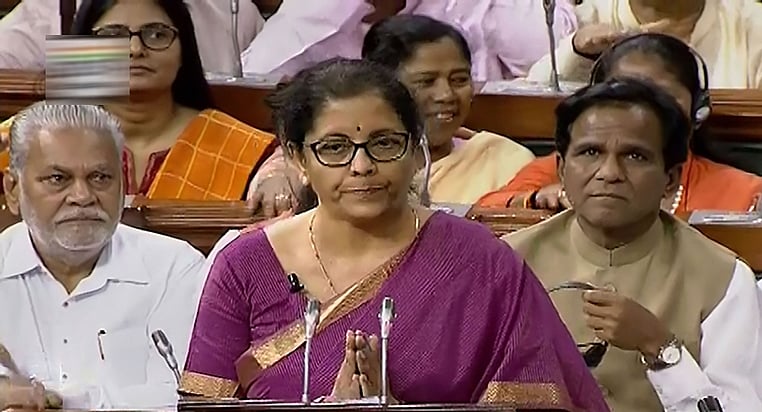While presenting her budget in Parliament, Finance Minister Nirmala Sitharaman tried to reason out her move to carry the budget papers in a red cloth. Red cloth otherwise has been a pariah for the saffron as it symbolised Marxism for them. But here it was something different. It signified the Hindu accounting process. In the old days, Hindu merchants, traders and business would wrap their accounts papers in red cloth and preceding they would worship goddess Laxmi for attaining more prosperity and wealth.
She, nevertheless, used the nationalist and patriotic ethos, as was resorted to by Narendra Modi, during the elections, to justify her action and send the message across that these two words would be the guiding philosophy of the saffron government. She later clarified, “I thought it is high time we move on from the British hangover, to do something on our own.” What she wanted to convey that there was a nationalist government to rule. The previous governments were not bothered by the independent identity of the country.
Her observation made it abundantly clear that in future it is the words and observations of Modi that would be fundamentals of the new work and new ideological and political line. Look at the clarification of the economic adviser K Subramanian, “It is in Indian tradition. It symbolises our departure from the slavery of Western thought. It is not a budget but a bahi khaata (ledger)”. He was trying to give a character to Modi’s word.
Yet another important feature of the budget has been the introduction of “nudge”. This was for the first time in the budget exercise that this word constituted a major component of the political economy. The concept is a subtle policy shift to encourage people to make decisions that are in their broad self-interest. It’s about making it easier for them to make a certain decision. Does Sitharaman intend to convey that Indians have been not prepared by the previous governments to make their own decisions? Why at this stage is an external thrust needed to make them move? Here is a catch. The move will not be of their own. It would be dictated by the saffron government. By knowing how people think, the saffron rulers, saffron economists and the decision-makers can make it easier for them to choose what is best for them, their families and society.
It would not be an exaggeration to say that more than reflecting the economic scenario prevailing at the ground level the Economic Survey for 2018-19 reflects the personal views and wishes of Modi which was articulately placed before the public by Chief Economic Adviser (CEA) Krishnamurthy Subramanian. The broad goal is to help drive economic strategy to achieve sustained real GDP growth of 8% so as to enable the fulfilment of the government’s grand vision of making India a $5 trillion economy by 2025.
Economic Survey recommends setting up of a special unit for application of behavioural economics in Niti Aayog. It also proposes ‘Behavioural Economics Audit’ of every programme. This would trigger changes. In fact, the Economic Survey 2018-19 favoured the detailed application of ‘behavioural economics’ as an instrument of change in India where social and religious norms play a dominant role in influencing behaviour. “Behavioural economics provides insights to ‘nudge’ people towards desirable behaviour,” says the Economic Survey. Arguing that insights from behavioural economics can help nudge individual behaviour – on savings, on buying health insurance, on using right inputs in farming – towards better outcomes, the survey calls for institutionalising this way of thinking.
The saffron brigade has come to realise that India cannot be transformed into a Hindu Rashtra unless the people change their behavioural pattern. Indian people so far have been walking on the path of secularism. It is the reason that the saffron vigilantes had to face challenges when they tried to impose their desire. Now with this new machination as well mechanism of pursuing behavioural economy, the saffron brigade desires to move fast towards its destination.
Economic Survey quotes that the so-called success of popular schemes like Beti Bachao, Beti Padhao (BBBP) and Swachh Bharat Mission (SBM), attributes to the successful application of behavioural insights to enhance policy impact. The Survey also at the same time says that the application of ‘behavioural economics’ would enhance the efficacy of public policies and programmes in India.
Modi government has come to realise that in order to continue to rule India for decades, it is imperative that the government influences the social and religious norms of people. The survey underlines that this type of approach will lead to the success of public policies and programmes. Nevertheless, before propounding these two ideas, the proponents ought to have realised that India is a multi-cultural state and some of the communities do not follow the lines as mentioned therein.
The Economic Survey aims for a sustained 8% real GDP growth with 4% inflation to attain Modi’s target of becoming a $5-trillion economy by 2025. It argues correctly that India needs to get into a virtuous cycle of fast growth, rising investment and savings. These ideas are being promoted at a time when the world economy is slowing with anti-globalisation sentiment, protectionism, nativism and trade wars pulling down growth everywhere. It must not come as a surprise if in reality growth rate falls rather than rises to 8%.
To promote the rightist policies, programmes and ethos, the government is using populism. One ought to realise that populism’s most salient characteristics are exclusivity, anti-elitism and anti-pluralism. In the prevailing scenario, we are in the halcyon days for populism, and this is impacting the nature of politics in general. However, it is difficult to define populism. This is partly because it has manifested in different ways at different times. Populism’s problems can be fixed by getting public better-informed. And that’s actually possible.
-Arun Srivastava
The writer is a freelance journalist.Views are personal.




